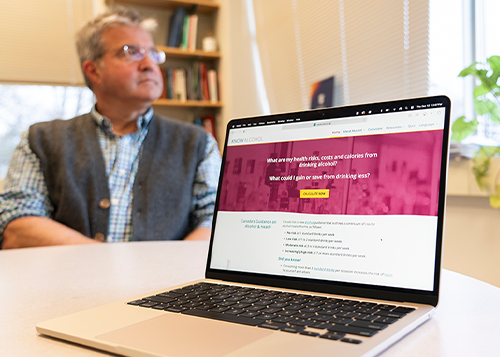Partnership
Our goal is to advance health system alignment through collaboration to shape practises and policies that improve the health and well-being of people and populations.
Achieving our vision relies on strong and collaborative relationships with other units within UBC, our academic partners across the province, health system organizations, industry, governments, and communities. We will continue to align efforts so that together we can best support the health and well-being of people and populations by helping to shape practises and policies that most effectively serve society. This involves listening to a wide range of voices and operationalizing what we hear through implementation of our goals and strategies.
We will continue to engage with our partners in ongoing efforts to counteract racism and discrimination in the health-care system. This includes collaborating to create and sustain shared learning and work environments where all can thrive and where all people, patients, families and communities feel respected, included, valued and safe.
Partnership Strategies
The UBC Faculty of Medicine collaborated to develop a comprehensive and meaningful Response to the Truth and Reconciliation Commission of Canada’s Calls to Action. The response is focused particularly on Calls to Action 18-24, and it identifies 14 action statements to which we are committed.
We will engage with Indigenous peoples, nations, communities, and organizations to seek partnerships with the aim of advancing these actions, which are related to Indigenous relationships, learning and work environments, admissions, curriculum, graduate, postgraduate, and professional education and Indigenous health research.
All our actions will be guided by the principles outlined in the United Nations Declaration on the Rights of Indigenous Peoples, in concordance with Call to Action 43, which stipulates the Declaration’s use as the framework for reconciliation. As stated in our response to the Truth and Reconciliation Commission’s Calls to Action, we recognize the central importance of the universal human right to self-determination, particularly as a determinant of health, and our clinical, educational, research and administrative practises will be guided by this principle moving forward.
Our commitments in this response are aligned with and further operationalize the UBC Indigenous Strategic Plan for the Faculty of Medicine. In addition, we will work with all relevant partners to advance the recommendations in the In Plain Sight report and the First Nations Health Authority policy statement on Cultural Safety and Humility.
We are committed to delivering on the pledges we have made and we expect to be held accountable as we make our way forward to a better future together.
Clinical care, research, and education are shared responsibilities of many organizations and individuals. We will build on our strong foundational relationships to further enhance collaboration within and across organizations to achieve greater synergy between these three interconnected activities through Academic Health Centres and Systems.
Our health system partners include health authorities, individual clinicians and clinical faculty, the B.C. government, the B.C Academic Health Sciences Network, patient and citizen groups, professional associations and colleges, and industry. We intend to work with these partners to create formal and informal structures that enable distinct organizations to better collaborate and improve governance without adding unnecessary bureaucracy.
We will collaborate with our partners to advance the ability of academic clinicians to dedicate time for clinical and/or didactic teaching, research activities, and clinical care delivery, all of which are mutually reinforcing and contribute to improving quality of care.
In addition, many of the people affiliated with the Faculty of Medicine are also part of partner organizations, and many of the environments in which they work are shared jurisdiction. We will actively collaborate on creating and sustaining respectful learning and work environments in all settings.
UBC Health enables cross-Faculty and cross-program collaboration, and the Faculty of Medicine is committed to engaging in these efforts. We see tremendous opportunity to advance shared priorities related to team-based care, collaborative and interdisciplinary research, inter-professional education, and data science and artificial intelligence that supports health education and research.
We will build on existing collaborative ventures, such as the School of Biomedical Engineering with the Faculty of Applied Science and the Life Sciences Institute with the Faculty of Science, and seek new opportunities for collaboration with other Faculties and Schools at UBC.
We continue to appreciate and value the strong relationships we have, both internally at UBC Vancouver and UBC Okanagan, and with our partners at the University of Northern BC and the University of Victoria, which have been vital to the success and growth of the distributed medical program, and more recent expansion and distribution of the Master of Physical Therapy and Master of Occupational Therapy programs. The strength of these relationships is a firm foundation for new collaboration with academic, health, and government partners to further expand and distribute training programs in order to meet regional health needs across B.C.
The Faculty of Medicine has a vast network of alumni who are committed to improving the health and well-being of patients, families, and communities. We seek to engage alumni from all Faculty of Medicine programs in further defining shared priorities and identifying mechanisms for mutual support and action.
As one of the leading Faculties of Medicine in Canada and the world, we seek to engage with other Canadian academic institutions, the federal government, and other national bodies to advance shared priorities. Beyond this, we will leverage UBC’s position as North America’s most international university, as recognized by the Times Higher Education, and build on our extensive international relationships to develop and implement our approach to global health and international relationships. Specifically, we will build alignment with national and international partners related to public health, global health, Indigenous health and wellness, and health system sustainability.
Industry and private companies play an important role in health and health systems in B.C. and around the world. The Times Higher Education also ranked UBC first in the world on the industry, innovation, and infrastructure category. We will build on this strength by continuing to enable industry partnerships and facilitating the commercialization process in appropriate, respectful and responsible ways. Through these partnerships with industry, we will maximize the impact of our work on improving lives around the world.
We are grateful for our current and future donor community with which we will continue to partner in support of important and innovative advances in research and training for improved health and health systems. Together with donors and civil society, we will collaborate on shared health and well-being priorities for the benefit of all, and in particular for underserved populations, to fulfil our contract with society.
Our Partnership pillar in action

UBC Medicine innovators join HATCH Venture Builder to develop transformative health solutions

Only seven out of 100 people worldwide receive effective treatment for mental health or substance-use disorders
Building the Future: 2021-2026 is the refreshed strategic plan for UBC’s Faculty of Medicine.
Special thanks to all the faculty, staff, students and partners across the province who have contributed to the development of this plan.



